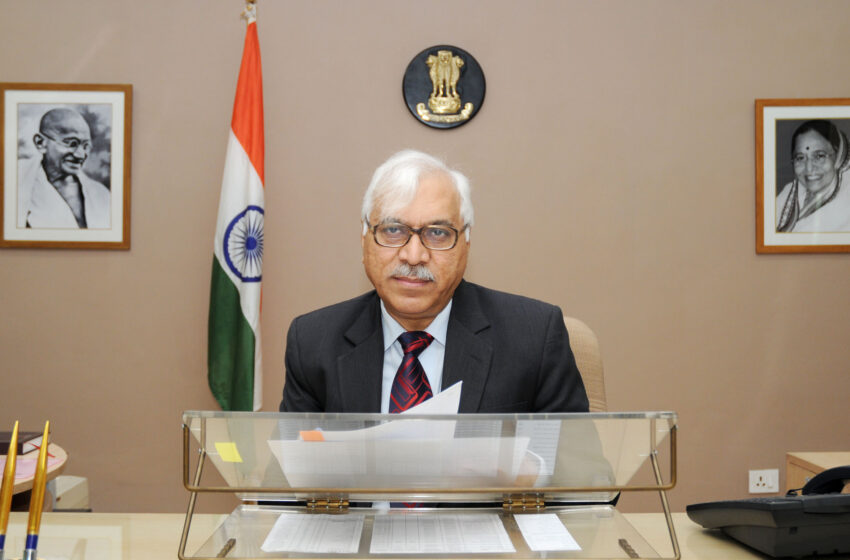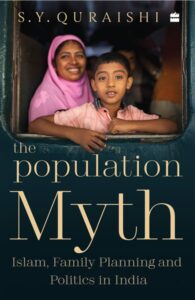‘Muslims can never overtake the Hindus’

Former chief election commissioner and opinion-maker DR SY QURAISHI, through his book – The Population Myth:Islam, Family Planning and Politics in India (Harper Collins, Rs 499, 336 pages) – evaluates India’s demographics from a religious perspective, to bust myths of a skew towards any
particular religion. He talks to SAURABH TANKHA about politics over population, if Muslims are responsible for population explosion in India and why is the literacy rate among Muslim men and women the lowest in the country
What made you give the statement: “Muslims will overtake Hindus does not make sense”?
There is a widespread right wing discourse that Muslims are multiplying so fast that they would soon overtake the Hindus and capture political power. It is true the Muslims have gone up from 9.8 per cent of the population in 1951 to 14.2 per cent in 2011, in 60 years. Hindus, on the other hand, have come down from 84 per cent of the population to 79.8 per cent. However, the situation is far from the exaggerated and provocative narrative that Muslims will overtake Hindus very soon and capture political power in India.
If it took 60 years for the Muslims to increase their percentage in the population by 4 percentage points, it should logically take 600 years to increase it by 40 percentage points! That, too, provided the growth rate remains what it has been all these years.
I requested famous Mathematician and former vice chancellor of Delhi University Prof Dinesh Singh to prepare a Mathematical model. That makes it clear that Muslims can NEVER overtake the Hindus. The fact is that Total Fertility Rate (TFR) of Muslims in India has seen a steep decline over the past few decades, as is evident from National Family Health Survey (NFHS)-4 data. The TFR of Muslims during NFHS-1 was 4.4 which has come down to 2.6 against 2.1 for the Hindus.
Family planning should not be not a Hindu vs Muslim issue as the two communities have similar statistics. In socioeconomic indicators which influence family planning behaviour, they stand shoulder to shoulder. It will not be incorrect to say that they are on the same end of the spectrum and not at opposite ends, as the widespread narrative goes. Their socioeconomic conditions are almost similar and region specific, and that is what determines their fertility behaviours.
Why is the literacy rate among Muslim men and women the lowest in the country?
Despite acquisition of knowledge being a sacred duty in Islam, it is indeed a strange paradox that the followers of a religion whose teachings begin with the first word iqra (read/ recite) are the most backward in education. The Sachar Committee report had identified poverty to be the major barrier to education among Muslims, as young children in the community are tasked with the responsibility of supporting their family instead of studying.
Muslims have faced socioeconomic poverty for the past several generations, and this has blurred their vision of education. Muslim settlements are lacking in proper infrastructure, and most schools are traditional, not being linked appropriately with employment opportunities.
An interesting thing to note here is that Muslims do not see attaining education as a means to formal employment because of the low representation of their community in private and public sectors and the perceived discrimination when it comes to securing salaried jobs. The community, especially members of the educated middle class, feels alienated as a result of the lack of opportunities in the administrative and political space.
Often, madrasas are the only source of education available to Muslim children in areas that have no schools for the Muslim masses. These children attend the madrasas not out of choice but due to unavailability and inaccessibility of other options, especially the absence of alternative means of education in their mother-tongue. The issue, however, remains that the madrasas have a theological base of teaching and often miss out the association between development of skill-sets and capabilities and employment opportunities.
Why politics over population?
The Hindu-Muslim polarisation originally started with the concocted narrative that Muslims are deliberately producing more children to capture political power. Since this right-wing fixation has gone practically unchallenged for decades, it has penetrated deep into the psyche of the Hindu masses, old and young. The right-wing organisations have been trying to provoke them to produce more children by starting a procreation war. There is no prima facie evidence, however, that this propaganda has succeeded in its mission. There seems to have been no study of the impact of this appeal on birth rates among the Hindus, though its impact on hate and polarisation in the society is writ large everywhere. This has a marked influence on electoral results, presumably the real objective of the propaganda.
Can the narrative of “Muslims being responsible for population explosion in India” change in a country which as you write has been due to “the predominant political ideology of ‘us and they’ that is injected into the masses by the right wing”?
The falsehood of the propaganda has to be called out. Muslims are catching up fast which is why the gap between two communities has narrowed enormously. The TFR gap came down from 1.1 points to the present 0.5 points over the course of four surveys. Although the unanimous opinion is that Islam is against permanent methods of birth control, namely sterilisation, whether of males or females, a large proportion (20.8 per cent) of Muslims has undergone sterilisation, which shows their eagerness to adopt family planning. No organised attempt, much less a political conspiracy, has been noticed among Muslims to produce more children to overtake the Hindus.
We also find that Hindus are a close second to Muslims in almost all indicators of family planning, and that the two communities are on the same end of the spectrum, not opposite.
So, making population growth in India a Hindu-versus-Muslim issue is uncalled for. We have seen in great detail that Islam is not against family planning at all. On the contrary, it is the pioneer of the concept, a fact that has got blurred over the years because of lack of awareness about it and skewed interpretations of the Quran and Hadith.
It is not surprising that most of the Muslim countries in the world have adopted family planning as a state policy and have achieved commendable results, mostly with the support of religious leaders.
In the end, I have appealed to the Muslim community not to be swayed by negative propaganda and must adopt family planning proactively in the interest of their community and the country.
Should India adopt a Uniform Population Control Bill?
Population control by legislation and compulsion can be counterproductive. Let’s not forget the backlash of compulsory sterilisation from which we haven’t recovered. Our country’s family planning programme has been a considerable success if we see that 24 of 29 states have already gone lower than the replacement ratio of 2.1.
When did the idea of penning this book strike you? How did you go about collecting the data?
The idea was born in a surprise development when UNFPA India’s Country Director Tevia Abrams visited me and requested me to write a strategy paper for family planning among the Muslims in India. This was a strange request as I was neither a Islamic scholar nor a family planning expert, never having worked in the health ministry either in Haryana, my service cadre, or in the Central Government. Not sure what I would write, I tried my best to excuse myself, but Tevia wouldn’t budge. The offer was financially attractive – 30 times my take-home monthly salary of Rs 5,000! Seeing his adamance, I agreed to do it, but an inner voice said I should do it pro bono. He insisted I get paid. So, we settled for a remuneration – one rupee! I requested him to send me a formal proposal on which I would get the approval of the Government of India.
That settled, I started looking around for ideas. I had no clue what would be the outcome. When I started the project, I was under the impression, like everyone else, that Islam is against family planning. But what I discovered during my research was an eye opener. I found that the reality was just the opposite. Islam was not only not against family planning but was actually the pioneer of the concept. What helped me understand the Islamic position was a fascinating book titled Family Planning in the Legacy of Islam by Prof Abder Rahim Omran of the greatest Islamic University, Al Azhar, Cairo.
It took me five months, instead of the stipulated one, to complete the paper. When ready, it caused quite a few ripples because of its unusual findings and recommendations. I sounded many Ulama and Imams to make sure I don’t end up getting fatwas against myself. Contrary to my apprehensions, I found extraordinary support from them. As I was also holding charge of Administrator Punjab Wakf Board, I decided to organise a national seminar on Rights of Women and Children in Islam, with Imams and teachers of madrasas to test the ground. The three-day seminar was a terrific success as it greatly enthused the participants, and gave me a clue how to approach the subject of family planning – through the rights route. I was asked to present my research paper at several conferences and lectures. There again I persisted with my decision not to accept any fee or honorarium. This decision proved providential.
Five years later, I was staying with my daughter in her hostel in London when I received a call from one Dr Qureshi, President of Muslim Doctors Association of UK, who said he wanted to ‘discuss’ my paper. I got the feeling that the tone was somewhat threatening. Not wanting to get beaten up in London, I tried to wriggle out saying I have my flight back early next morning. The guys arrived at the airport with a few books in hand. The opening sentence was such that I have remembered it all these years. “Mr Quraishi, family planning is a Western conspiracy against Islam. They hire, through UN agencies, mercenaries like you to write such papers.”
Well, the charge would have stuck. I was indeed “hired” by a UN agency, UNFPA. If I had accepted even a rupee, I could be considered a mercenary. I did not collect even the one rupee that was agreed upon. This gave me the moral authority to pounce back on them. They went away sulking, promising to send me some more literature later, which would help me change my mind. They never did. For a long time, I thought I must upgrade the paper to a full-fledged book. It has taken over twenty years for this vision to become a reality.
The data for this book has been collected from National Family Health Surveys (NFHS-1, NFHS-2, NFHS-3, NFHS-4), Census of India, ORG Surveys, UNFPA, and other research studies.



